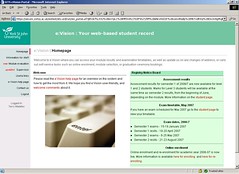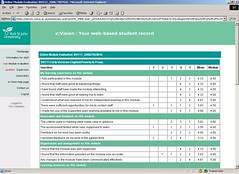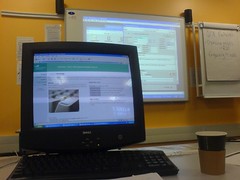Paper. We get through so much of it it's not true. Or rather, it shouldn't be true.
I've no idea how many trees it takes to make a ream of paper (no doubt Wikipedia could give me number), but I'm sure there's a forest somewhere feeling significantly smaller as a result of two recent Registry projects. The first was servicing the year-end Exam Board, where everyone's results and awards are ratified and formally signed off, and the second was the publication of those results and awards to all the students.
The business of the Exam Board is to work through individual profiles for almost all our programmes, to discuss what needs discussing, and to confirm awards and progression. The profile itself is a Microsoft Access report, landscape format, with module and programme info for about half a dozen students on each page -- the modules they've registered for across all academic years, the marks they've received, the number of attepmts they took, the credits they've gained, and for finalists the award calculations and classifications they end up with.
There are pages and pages of these profiles, about four to five hundred for the July Board, and we need about twenty sets for all the members of the Board, Heads of Programme, Exam Officers and so on. And who knows how much paper we get through beforehand, when we first start running these reports, finding errors, reprinting, finding gaps, reprinting, inconsistences, reprinting. It all adds up.
The question of whether there's another way is one we hope to have answers for in the coming academic year. Possible avenues of enquiry include projecting the Board's set of profiles onto a screen in the boardroom, or perhaps filling the room with laptops or tablets or something. The mechanism for producing these reports will have to be re-written, but that's long overdue anyway. Something must be done.
And the second Registry project, hot on the heels of this one -- the publication of results -- is another A4-heavy process that is not sustainable, going forward. Currently every student whose profile goes through the Board get a letter. Thousands and thousands. It's right and proper that finalists should get the 'congrats-here's-your-award' letter, so too for the 'sorry-you've-been-terminated' letter, but the normal fail/resit letter? The normal pass/progress letter? There must surely be a greater role for
e:Vision and e-mail in all this, for these thousands of bog-standards communications. The 'next actions' from these results letters, to borrow a
GTD term, are in the main tasks like re-enrol for the next session, or register for re-sits; the former an e:Vision task, the latter soon to be. So let's have it all online.
The more applications and services we push online the better, as far as I can see, not just in terms of improving our service to staff and their Exam Board profiles (faster access to the data, improved portability, clearer presentation of information, more convenient and useful formatting) and students and their results (no postal delays, instantaneous processing, 24 hour access, off-site access, with of course e-mail support and phone support), but also in terms of improving how we use our resources.
The whole save-the-planet campaign seems to be bordering on the manic these days (where's the equivalent one about human trafficking, say, or Darfur) but however corny the sentiment it's up to us to play our part, to find areas to improve and, in improving them, move us all along a little.



